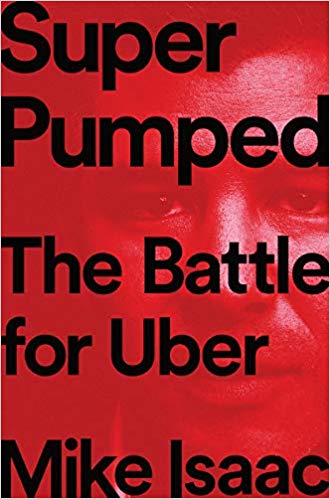You have /5 articles left.
Sign up for a free account or log in.
 Super Pumped: The Battle for Uber by Mike Isaac
Super Pumped: The Battle for Uber by Mike Isaac
Published in September of 2019.
We have complicated feelings towards Uber.
On the one hand, we worry what Uber symbolizes about our shared future of low-wage insecure gig employment, and the profound certainty that AI-powered robots will eventually replace our jobs. On the other hand, we have internalized Uber (or Lyft) as our go-to transportation choice whenever we travel for work or pleasure, as summoning a car from our smartphone remains both more reliable and less expensive than hailing a taxi.
What we never say out loud nowadays is anything resembling a desire for someone to create “the Uber of higher ed.” We know too much about Uber being built on the labors of low-paid drivers. While we may attempt to soothe our conscience by tipping after each Uber ride, we are painfully aware that a few dollars in tips are an insufficient substitute for decently paying full-time jobs with benefits.
Besides, we know that higher ed as an industry has already been all too happy to follow the Uber playbook of employing a contingent and low-paid workforce to make the numbers work.
Given these complicated feelings about Uber - and our understanding as to why the Uber model is the worst possible example for higher ed - why read Super Pumped?
To be clear, not every book that we read must teach us something about the future of academia. My (perhaps unwise) idea in talking about books from a higher ed perspective is that we are talking about books on Inside Higher Ed. Books, for me, are both an excuse to think through the world that we inhabit, and a source of new ideas and perspectives that might inform our work.
In Super Pumped, the lessons are almost all cautionary. Uber is many things. The world’s fastest-growing (by valuation) startup. A business model tsunami that forever altered (and largely destroyed) the incumbent taxi industry. An accelerator and prime example of the bifurcation of employment opportunities between a few good jobs (the Uber engineers) and many many terrible jobs (the Uber drivers).
What Uber mostly is, and what we learn in great depth in Super Pumped, is a tragedy.
Mike Isaac, whose day-job is a technology reporter at the NYTimes, has chosen to tell the story of Uber as the story of its co-founder and first CEO, Travis Kalanick. Nobody should feel bad Kalanick, as the 43-year-old is sitting on a net worth of almost $4 billion. At the same time, it is hard not to read Super Pumped without concluding that if Kalanick had only shown a bit more wisdom and empathy, that he would still be today running the company that he poured so much of his life into starting.
Super Pumped is the definitive telling of the ethical breaches and cultural dysfunction that first enabled, and then put at risk, the ascension of Uber. I had thought that I had known how horrible the Uber culture was at the height of Kalanick’s reign. In truth, I had no idea.
Separating Uber’s culture from Uber’s business model is a difficult task. For so many years, one seemed to feed and depend on the other. Would Uber have moved into so many cities so rapidly if the company had prioritized ethics in its business operations? Unlikely.
Super Pumped does a terrific job, however, of untangling the ethical and personality shortcomings of Uber’s early executives (which were many) with the broader meaning of Uber’s impact on transportation and employment. Isaac does an admirable job of placing the Uber story in the broader context of changing patterns of mobility and work.
Coming back to a higher ed perspective, I’d say the main lessons from Super Pumped are not technological but cultural. Any leader that does not prioritize a health culture will put the organization at risk. The work to develop a healthy organizational culture should not be considered a “nice to have,” something to be done after the “real” work is attended to.
The story of Uber illustrates that both success and failure stem from the ability of an organization to develop a set of ethical guidelines, and to then rigorously insist that every decision aligns with those principles.
It is hard to imagine that some of the trends that most define our higher ed industry, such as the growth of the contingent faculty workforce, could ever be a match for the values to which we aspire. In creating the future of higher ed, we should think about Uber as a cautionary tale of the things we should not do in our efforts to challenge the existing status quo.
What are you reading?




